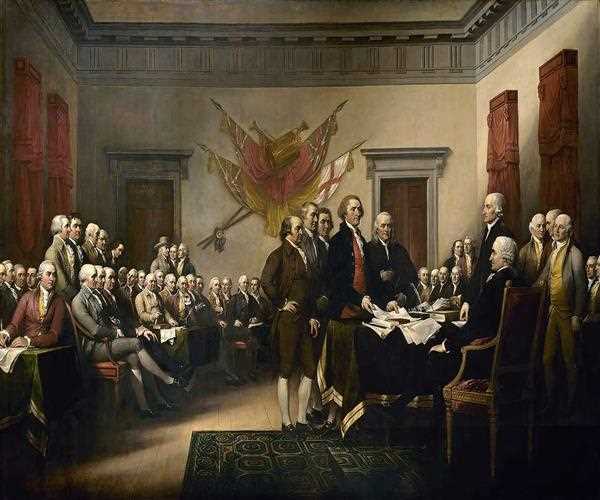At the point when in the Course of human occasions, it ends up vital for one individuals to break down the political groups which have associated them with another, and to expect among the Powers of the earth, the different and equivalent station to which the Laws of Nature and of Nature's God entitle them, a not too bad regard to the sentiments of humankind requires that they ought to announce the causes which actuate them to the partition.

That to anchor these rights, Governments are initiated among Men, getting their equitable forces from the assent of the represented, That at whatever point any Form of Government winds up ruinous of these closures, it is the Right of the People to adjust or to nullify it, and to establish new Government, establishing its framework on such standards and arranging its forces in such shape, as to them might appear to be well on the way to impact their Safety and Happiness.
"The Laws of Nature and of Nature's God" - are the establishment of the political standards of American freedom. As put forward in the works of Locke, Sidney, and others, it implies that nature has characteristic laws by which every individual has a heart, responsibility for one's activities, and an obligation to not hurt others or their property. It isn't the "law of the wilderness," nor permit, yet an ethical code that ties us together in families and networks, show in English precedent-based law, and in religion. It perceives the intrinsic capacity surprisingly and their justices to utilize reason and confidence to pick ethicalness, the benefit of all and affability, over bad habit and defilement.
"We hold these facts to be self-evident" (Jefferson utilized the words in his first draft, "hallowed and unquestionable") - affirms that there are sure realities that all individuals will undoubtedly recognize, for example, the equity of the privileges of man, including the privilege to represent his or her life and property.
All men by Nature are equivalent can't see a wide range of Equality… [but] in regard of Jurisdiction or Dominion one over another... being that equivalent Right that each Man hath, to his normal Freedom, without being subjected to the Will or Authority of some other Man." (Second Treatise on Government) We are on the whole equivalent according to our Creator, meet in our characteristic rights, and equivalent under the steady gaze of the law.
"that they are supplied by their Creator with certain unalienable Rights, that among these are Life, Liberty and the quest for Happiness." A religious people ascended in disobedience to Great Britain in 1776, and by far most of the American pilgrims had confidence in God, the Bible, and in the production of man. Notwithstanding for "deists" like Jefferson, there was an affirmation that God is the creator of freedom and of the normal privileges of every individual.
He wrote in 1774: "The God who gave us life gave us freedom in the meantime; the hand of power may pulverize, yet can't detach them." Jefferson recorded that, "Bliss is the point of life. Ethicalness is the establishment of happiness."[2] Our characteristic rights are divine endowments and not subject to human awards. The expression "unalienable" means unequipped for being sold or exchanged.